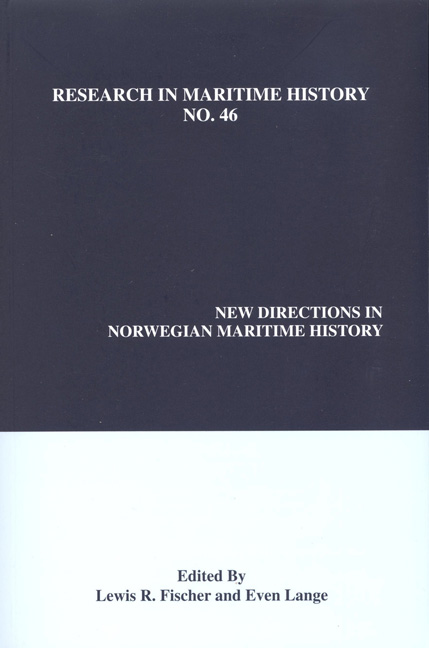Book contents
- Frontmatter
- Contents
- About the Editors
- Contributors' Notes
- Introduction
- Global Integration
- Political Issues
- Success and Failure
- “International Maritime Trade Politics and the Case of Norway, 1948-1990”
- “Inheriting Strategies: Understanding Different Approaches to Shipping during the World War I Boom in Haugesund, Norway”
- “Why Did They Fail? Business Exits among Norwegian Shipping Companies since 1970”
- “Little Man, What Now? Company Deaths in Norwegian Shipping, 1960-1980”
“International Maritime Trade Politics and the Case of Norway, 1948-1990”
from Success and Failure
- Frontmatter
- Contents
- About the Editors
- Contributors' Notes
- Introduction
- Global Integration
- Political Issues
- Success and Failure
- “International Maritime Trade Politics and the Case of Norway, 1948-1990”
- “Inheriting Strategies: Understanding Different Approaches to Shipping during the World War I Boom in Haugesund, Norway”
- “Why Did They Fail? Business Exits among Norwegian Shipping Companies since 1970”
- “Little Man, What Now? Company Deaths in Norwegian Shipping, 1960-1980”
Summary
Introduction
The politics of international shipping changed fundamentally between the 1960s and the 1980s. From World War II until the early 1960s, the field was dominated by actors from a few countries in Western Europe and North America. The level of government involvement in deep-sea maritime transport was fairly limited. A few decades later, this activity was much more politicized. Further, international shipping policy decisions were developed in complex international processes involving a broad spectrum of international organizations, transnational industries and inter-governmental networks.
The aim of this article is twofold. First, it will discuss developments in international shipping politics from the immediate post-World War II decades until the late 1980s. It will focus especially on the formation of international organizations and networks and will examine how they influenced the politics of shipping. The key objective is to understand the dynamic development of an international – or perhaps transnational – policy field. What were the roles of the different organizations and networks in the policy field, and how did they develop over time? How did the various entities – organizations, networks and governments – affect each other? Second, it will discuss the role of Norwegian actors in the field of maritime trade politics. It seeks to understand the dynamics of the field and to analyze their actions and reactions to developments in international shipping politics. Who were the actors which created the Norwegian policies? What were their strategies? How did they work? And did they have any influence on policies at the international level? This part will both provide a broader understanding of Norwegian international maritime trade politics and serve as an example of how actors adapted to changes in the field in general.
Some clarifications should be made at the onset. First, the primary focus of this study is politics rather than policies, that is, the aim is to analyze the circumstances and context of policy decisions rather than the policies themselves. Second, it discusses international, rather than national, shipping politics. To some degree, the national and international dimensions cannot be separated, but it is the international dimension that is my main concern. Third, the article focuses on maritime trade politics as opposed to technical regulations, manning policies and the like.
- Type
- Chapter
- Information
- New Directions in Norwegian Maritime History , pp. 151 - 176Publisher: Liverpool University PressPrint publication year: 2011



